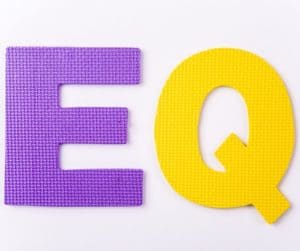
Have you ever encountered someone who remains calm, cool, and collected in stressful situations? If you wonder how they do not fold under pressure, the answer is a high EQ or emotional intelligence. Achieving emotional stability when facing obstacles starts with self-awareness. Understanding your EQ and keeping your emotions in check will help you master all areas of life. To test your EQ and see where you rank, Berkeley University offers a quiz.
Emotional intelligence has five components and requires work and a desire for personal growth. Here are the components and recommendations on how to improve your EQ.
- Self-awareness: Knowing how you feel and react takes humility and a deep understanding of your identity. Self-awareness is knowing what triggers your emotions and how you behave. Going beyond that, you recognize how your feelings impact you and others. You can identify your strengths and areas that need improvement. To maintain self-awareness, writing in a daily journal helps you see growth opportunities. Meditation has been an effective technique to improve self-awareness and a deeper knowledge of yourself. Ann Purcell’s book, The Transcendental Meditation Technique: The Journey of Enlightenment, acts as a valuable guide.
- Self-regulation: Having self-discipline and knowing when to bite your tongue is another component of EQ. Thinking before you act takes strong self-regulation sometimes and will save you from saying something you regret. You need to be able to adapt, manage internal and external conflict, and cope with challenges. Stepping back and thinking before you speak reduces potential conflicts. The Tao of Calm by Pam Metz has verses to help you maintain your composure and build self-discipline.
- Motivation: Striving to do better for yourself and accomplish all your goals requires consistent motivation. This component of EQ focuses on personal growth to have success and happiness in life. For those struggling with motivation, ask yourself what prevents you from trying to become more. Set a goal, list the reasons why, and try to accomplish it. The more you acknowledge the small steps you make, the harder you will work to achieve your goal.
- Empathy: Having compassion and concern for others is the EQ component of empathy. You care for others and also yourself without being selfish. Empathetic people are more open-minded and understanding of others’ feelings. To work on this element of EQ, observe your surroundings and interact with people. Also, take note of your energy and pay more attention to those around you. If someone exhausts you, they will hinder your personal growth. We have written a blog post discussing Empathy in Children.
- Social Skills: Being able to communicate and work as part of a team requires social skills. Making yourself more approachable will form positive relationships with others and benefit both parties. Understanding how to listen and comprehend what someone is saying builds your EQ. Paying attention to your body language, tone of voice, and making eye contact comprise healthy social skills. To improve your EQ and social skills, enter new situations and force yourself to communicate.
Embarking on the journey to improve your EQ requires your desire and focus. If you want to change and become a better person, raising your EQ helps. People with higher EQs live happier lives and have more positive relationships all across the board.
